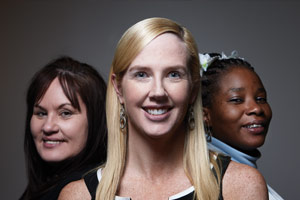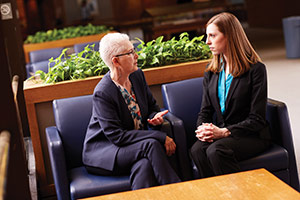features
Helping Victims of Human Trafficking
 PHOTO: KEVIN KOPANSKI
PHOTO: KEVIN KOPANSKIMaureen Kenny (center), with Rachel Kaisk (left) and Annette Mango (right)
 PHOTO: KEVIN KOPANSKI
PHOTO: KEVIN KOPANSKIJudith Lipton and Sarah Stula
Maureen Kenny was in law school when a speaker upended the world she thought she knew.
Author and activist Theresa Flores had come to describe her harrowing past: As a track-running teenager in an upper-middle-class Detroit suburb, Flores unwittingly had been drugged, gang-raped and blackmailed into sex slavery, a nightmare that lasted two years—even as she lived at home, attended high school and told no one, including her parents. It ended only when her father's job took the family to another city.
Flores didn't tell anyone for 20 years. But now, as the founder of S.O.A.P. (Save Our Adolescents from Prostitution), she is telling as many people as she can. It's a mission that Kenny—who never heard of human trafficking before hearing Flores speak—has joined.
"Once I learned about human trafficking, it was impossible for me to turn away," said Kenny, JD, a Case Western Reserve School of Law professor and co-director of the school's new human trafficking project, which is part of its Criminal Justice Clinic. "It could be anyone's daughter."
Indeed. Flores' website (traffickfree.com) has this unnerving statement: "If you don't think human trafficking happens in your zip code, think again." Nearly 14,600 cases of sex trafficking in the United States have been reported to the National Human Trafficking Resource Center hotline since 2007, according to the Polaris Project, a Washington, D.C.-based nonprofit that operates the hotline and works to combat human trafficking. Or consider this: Ohio, with its extensive highway system and numerous truck stops, ranks fourth among states for cases reported to the hotline.
Kenny, a professor of lawyering skills, launched the new law school project with Judith Lipton, JD, associate dean for experiential education and the Honorable Blanche E. Krupansky and Frank W. Vargo Jr. Professor of Law. It is funded by a one-year, $131,169 federal grant from the Ohio Attorney General's Office.
"For some students, this is a much better way to learn," said Lipton, who also has a master's degree in social work. "They're learning complex problem-solving in a world of uncertainty."
Students work under faculty supervision to help human-trafficking victims navigate myriad legal issues, which can involve child custody, immigration status, victim compensation, restraining orders and criminal charges stemming from their forced involvement in illegal activities.
Lured Away
One of the project's first clients was Rachel Kaisk. She said she was 16 when a man pretending to be a wealthy lawyer lured her from her parents' Barberton, Ohio, home. "I packed a little bag and tiptoed out of the house," she said. "My mom and dad were sleeping. I didn't see them for five years."
Kaisk said the man forced her into prostitution at truck stops, threatening to kill her parents if she didn't comply. The next 14 years were marked by unending pain: arrests, beatings, a crack addiction and a forced abortion. Like many victims, Kaisk didn't identify her experience as human trafficking. "I know that I was scared to leave," she said. At age 30, Kaisk finally freed herself of sex slavery and drugs. But 17 years later, she still bears psychological scars. The sound of a door slamming or her children playing can trigger terrifying memories. "If you were on the streets, it takes a long time [to recover]," she said.
Kaisk recently turned for help to the Renee Jones Empowerment Center (a Cleveland nonprofit organization that helps human trafficking victims). It referred her to the law school project, which now is working with Kaisk to have her criminal record set aside, an option allowed under Ohio law for victims of human trafficking. It's also working with her to find permanent housing.
Cleveland Municipal Court also has developed a way to help. Concerned that Cleveland had become a hot spot for human trafficking and that victims were ending up as court defendants, the court created a special Human Trafficking Docket in 2014. It offers an alternative process for handling cases of victims coerced into illegal activity.
As part of that mission, it provides "access to services, including mental health, substance abuse treatment, emergency housing, wellness and trauma services," said Judge Marilyn B. Cassidy, JD, who presides over the docket and previously worked as an assistant county prosecutor and, before that, as a registered nurse. The court also refers victims to the law school project for assistance.
Annette Mango landed in Cassidy's court after a long odyssey that began in Cleveland when she was 16, became addicted to crack and eventually turned to prostitution to support her habit. She gave her earnings to drug dealers, unaware they were controlling her. Mango entered a recurring cycle of jail, treatment and probation, finally recognizing, with the aid of Cassidy's court, that she needed help—not only with her drug problem, but also with underlying self-esteem issues.
Mango is in counseling and studying for her high school equivalency diploma with the help of volunteer undergraduate tutors at Case Western Reserve. "I missed a lot of time," said Mango, now 50.
Advocating for Victims
Kenny explained that survivors, some as young as 12 when initially trafficked, face unique challenges. "For every year [victims] were in 'the life,' it takes them several years to regain their composure," she said. "They may need to learn everyday tasks like paying bills, balancing a checkbook, buying a car."
Kenny's advocacy for trafficking victims takes her into the school clinic and beyond. She's on the state Human Trafficking Commission, working on legislative policy issues, and is a passionate speaker at community programs.
At a January training session at the Ritz-Carlton in downtown Cleveland—held to familiarize hotel staff with signs of human trafficking—Kenny and three co-panelists detailed some of the behaviors that can raise red flags: girls dressed scantily in the winter; young boys in the company of much older men; women who seem submissive, avoid eye contact or are threatened with words or a look by their companion.
Like Kenny, Sarah Stula, a third-year Case Western Reserve law student working in the school's human trafficking project, first learned about the plight of trafficking victims during a speech—this one by then-U.S. Secretary of State Hillary Clinton.
It's what inspired her to study law. "The more I heard about human trafficking, the more horrified I became," Stula said, "and I knew I had to do my part to stop it."
After graduating, Stula sees herself "prosecuting traffickers, defending victims from prosecution for crimes related to their victimization, and creating victim-friendly laws."
Mango, having survived decades of suffering, also is determined to help victims. "I have to do it," she said. And as she gains strength and moves ahead, Mango can, by example, offer other survivors hope for a better life.
"I'm living now," Mango said with a smile. "I'm alive."
Human trafficking: The use of force, fraud or coercion to compel individuals to provide commercial sex, labor or services against their wills.





